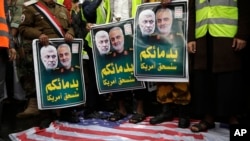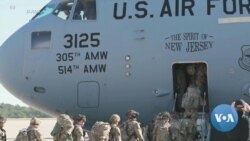The airstrike that killed Iranian Quds Force commander Qassem Soleimani may have been part of a bigger campaign designed to cripple Tehran’s elite military unit.
U.S. officials confirmed Friday that the same day Soleimani was killed, a second airstrike attempted to take out the top Quds Force commander in Yemen.
Officials, speaking on condition of anonymity, said the airstrike targeting Abdul Reza Shahlai was not successful, but they declined to share additional details of the classified mission.
The Pentagon declined to discuss the failed airstrike, first reported by The Washington Post.
“The Department of Defense does not discuss alleged operations in the region,” Pentagon spokeswoman Navy Commander Rebecca Rebarich said in a statement, which said Yemen “is long understood as a safe space for terrorists and other adversaries to the United States.”
WATCH: Trump's Political Problems at Home May Have Reinforced Decision to Strike Iran
Shahlai's record
Shahlai, currently based in Sanaa, has a history of targeting U.S. forces.
U.S. officials said Shahlai was the mastermind of a January 2007 attack in Karbala, Iraq, that killed five U.S. soldiers and wounded three others.
The U.S. said he also directed and paid $5 million toward the plot to assassinate the Saudi Arabian ambassador to the U.S. in a Washington cafe in 2011.
The U.S. Treasury Department named Shahlai a Specially Designated Global Terrorist in 2008 and 2011.
Shahlai’s name had been listed in connection with a $15 million reward under the U.S. Rewards for Justice program seeking information leading to the disruption of Iranian terror financing.
U.S. President Donald Trump on Friday defended the January 3 airstrike against Soleimani, telling Fox News that Soleimani was plotting imminent attacks against U.S. targets.
“We will tell you that probably it was going to be the embassy in Baghdad,” he told the news network, adding other diplomatic posts were also in Soleimani’s sights.
“I believe it probably would’ve been four embassies,” Trump said.
Soleimani was killed shortly after he flew from Damascus to Baghdad to meet with leaders of Iranian-backed militias in Iraq.
Trump administration officials have also blamed Soleimani for killing American armed forces, including a U.S. contractor at a base in Kirkuk, Iraq, this past December, while fomenting unrest in Iraq and Lebanon.
National Security Correspondent Jeff Seldin at the Pentagon contributed to this report.








